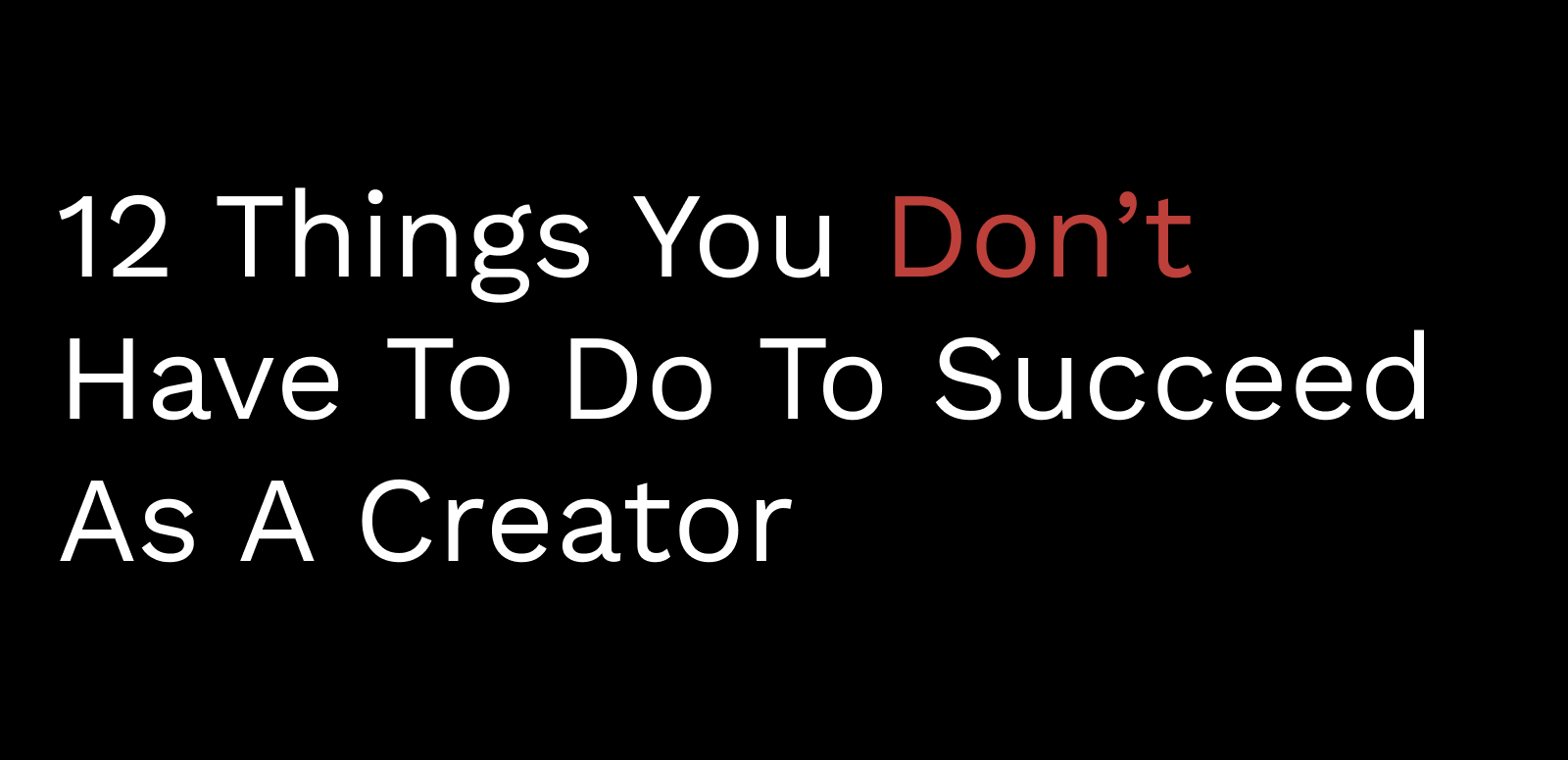It’s easy to feel you need to do certain things to succeed as a creator.
You don’t.
I hope the following list frees you from pressure and guilt you may feel and gives you permission to focus on what you actually want to do.
You’re closer to success than you realize.
1. You don’t have to monetize.
Don’t let others define success for you.
Maybe it means getting paid, maybe it doesn’t.
There’s nothing wrong with creating to express yourself, improve the lives of others, or simply because you enjoy doing so.
There’s actually a lot right with that.
2. You don’t have to pick one niche.
Does focusing your efforts on creating for a specific audience make it easier to succeed?
Yes.
Is it the only way to succeed?
No.
Ali Abdaal is a doctor who creates content about study tips, productivity advice, and helps people grow on YouTube.
Gary Vaynerchuk creates content about marketing, wine, garage sales, and life.
They’re doing fine with multiple niches. You can too.
3. You don’t have to be everywhere.
The more social platforms you use, the less you’re likely to get from them.
Pick one or two platforms you love and focus the majority of your social media efforts on it as opposed to spreading yourself too thin trying to do it all.
There are more than enough people on any one platform for you to succeed beyond your wildest dreams.
4. You don’t have to create videos.
Or blog posts.
Or a podcast.
Create whatever you want in whatever format you want.
There’s no magic format you must use to succeed.
5. You don’t have to make it about you.
It’s not about you anyway — it’s about your audience.
Share as much or little about yourself as you want.
Your success will be determined by the value you create for others, not the details you reveal about yourself.
6. You don’t have to quit your job.
You can be a successful creator without being a full-time creator.
It’s often easier to do so because your “day job” provides financial stability that allows you to create with a long-term outlook and less pressure to support yourself with your creations.
My creations were a side project for 20 years while I built my career before making the leap to become a full-time creator.
The lessons I learned, people I met, and experience I got from those “day jobs” were valuable and the root of my eventual success as a full-time creator.
7. You don’t have to have an email list.
An email list is the most reliable way to reach your audience, but…it’s not the only way.
Plenty of creators succeed without an email list and instead focus on attracting YouTube or podcast subscribers, social media followers, or customers.
(Though smart creators do try to convert those to email subscribers as well.)
8. You don’t have to use a lead magnet.
You don’t need to use bait to get people to join your email list.
If you send valuable emails, then you don’t need to trick people into subscribing by offering them something else.
Plus, if your lead magnet is that valuable you’ll get more subscribers by making it available to everyone than you will hiding it behind a signup form anyway.
Once they see how great it is, they’ll want to subscribe.
I didn’t need a lead magnet to get 18,000+ creators to subscribe to my newsletter — I just needed to share tips to help you produce, promote, and profit from their creations.
9. You don’t have to reveal who you are.
While the better people know you the more likely they are to connect with you, that doesn’t mean you can’t remain anonymous and succeed.
All that truly matters is that you provide value through your creations.
Do that consistently and people will want more from you…even if they don’t know exactly who “you” are.
10. You don’t have to have any credentials.
You don’t need a degree.
You don’t need a certificate.
And you don’t need permission from anyone.
Don’t let insecurity prevent you from pursuing your dreams.
Your creations speak for you, not your resume.
11. You don’t have to stick with it.
Successful creators quit.
All the time.
They abandon projects that don’t work, evolve their interests, and shift their approach as they learn from failures (and successes).
You’re not trapped and you’re not a failure— it’s OK to move on.
12. You don’t have to have started years ago.
It’s never too late.
As the saying goes, the best time to start may have been a decade ago but the second best time to start is today.
Don’t worry about when others started — their path has no impact on your own.
Success isn’t a zero sum game.
Go for it.
